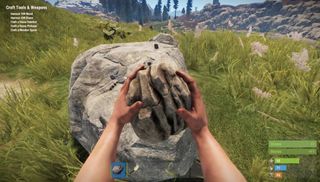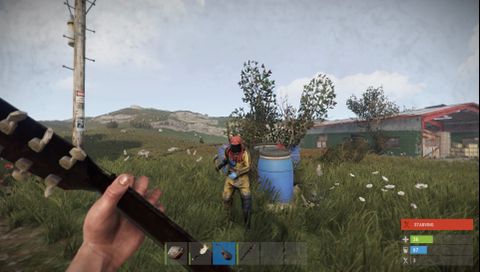Our Verdict
Rust is a malicious experience rife with betrayal, cruelty and greed. That can make it both frustrating and sublime in equal doses.
PC Gamer's got your back
What is it? A survival game set on island with a heavy emphasis on bloodthirsty PvP.
Reviewed on: Windows 10, Intel CoreT i5 7500 @ 3.4GHz , 16 GB RAM, NVDIA GeForceT GTX 1060 3GB; Also tested on Core i7-6700K, GTX 980.
Price: $35/£27.79
Release date: Out now.
Publisher: Facepunch Studios
Developer: Facepunch Studios
Multiplayer: Online only. Huge server lists with a variety of specific distinctions, topping out at about 200 players.
Link: Official site
Rust makes better use of voice chat than any game I've ever played. You are naked and alone on the world's silliest island. There is no narrator or announcer, so instead you submerge in the quietude of the unkempt grass crunching beneath your feet, as you uselessly smash your rock against the nearest pine tree. Perhaps you've also harvested some mushrooms and a few bundles of flax; enough to stave off the hunger pangs and fashion yourself a burlap shawl to cover your shame. If you're particularly industrious, you'll have furnished a nice wooden shack a stone's throw away from some fresh water and reliable resources—the entry-level homestead necessary for any successful Rust campaign.
But then you hear it. Faintly at first. Carried on the tip of the breeze. It's another idiot in Rust.
I don't know what it is with this game. Maybe it's the fact that you spawn unclothed and uncensored, maybe it's the brutal vastness of the design, or maybe it's the simple uncouth joy of doing bad things to other human beings, but Rust has a distinctly regressive effect on the human species. The voice chat merges with the draw distance, so when you're spotted by an idiot, you'll start hearing the shit-talk quietly tickling your ear. They get closer, they get louder and more confident, and suddenly you're hopping over shotgun shells while absorbing an entire dictionary of insults.

No game has ever indulged our lack of humanity quite like Rust, and I wish I didn't mean that as an endorsement.
It's so hilariously antagonistic that I wish I could say I didn't love it. I wish I could say that it didn't feel incredible when one of those naked idiots charged me with their rock and I switched to the battle axe I fashioned out of scrap metal (which he almost certainly didn't know I was carrying), and put him down with a single well-placed strike. I wish I could tell you that, as I was standing over his fatally wounded body, that I didn't laugh my ass off when my headphones were filled with the voice of a prepubescent boy shouting, "Hey man, wait a second!" I wish I could say I didn't kill him anyway. No game has ever indulged our lack of humanity quite like Rust, and I wish I didn't mean that as an endorsement.
If it feels like we've been living with Rust for a long time, that's because we kinda have. The game was first released in Early Access in late 2013 by developers Facepunch Studios, and it's been a mainstay of goofy YouTube send-ups ever since. If you're somehow unfamiliar with the premise, think of Rust as a dumber, more nihilistic Minecraft. You wake up on a map armed with only a rock and a torch. You quickly figure out that, by banging your rock on a few environmental doodads, you can harvest a few basic resources (stone, wood, and cloth) which you can parlay into a few prehistoric instruments, like a spear or a hatchet. This is similar to the scrounging mechanics in plenty of other survival games, but what makes Rust different is how deep that tech tree goes. Eventually, from those same basic ingredients and a few mechanical leaps of faith (like work benches and furnaces), you'll be able to craft pistols, flamethrowers, and rocket launchers. Rust famously does not quarter off its servers to keep entry-level nakeds away from the roving troops suited up in advanced firearms, which means that occasionally, your journey will end with you matching another player's revolver with a rock that you've tied to a stick.

This is the heart of Rust. Wake up naked, run for your life, do horrible things to one another. There is no grander narrative, or mythos, or win condition. Most of the servers are on a strict weekly or monthly reset schedule, which scrubs the island of any lingering housing or fortifications left behind by the players, which gives the experience a strange sense of futility. Yes, you will need to manage your hunger, thirst, and health—and as you ratchet up the tech tree you will discover increasingly effective ways to stay alive—but that's it. Sure there are some areas on the map that are stricken with radiation, which leads to the implication that perhaps you and the rest of your misanthropes are occupying a far-flung, post-collapse society, but those moments feel more like window dressing than anything else.
I spent the vast majority of my time in Rust playing solo, but I don't want to discount the notorious community of players that band together in clans, and wage wars of aggression along the shared hunting grounds. One of the fascinating kernels of Rust's brutality is how everything in the world remains persistent, even if you're logged off, which means that smart players arm their bases with land mines, punji sticks, and keypad locks while they're away. (Some clans even recruit players across all time zones, to make sure there's always someone on guard.)
That's a coordination I appreciated from a distance. There are a number of YouTube documentarians showing off the multi-man raids that spawn from committed Discord channels all over the world. Instead, I engaged with the population of Rust on a purely incidental level. An extremely geared man takes pity on you, and drops a crossbow at your quivering feet. That's Rust! A kid and I are raiding an abandoned gas station for food and weapons, and I give him the extra pair of pants I was carrying around. When I'm turned the other direction, he bashes his rock right through my skull and runs off with the rest of my stuff. That is also Rust.

I'm utterly entranced with how little faith it has in our ability to get along.
Given the tone, it shouldn't be surprising that the community I found in Rust tended to be fairly juvenile and toxic. There's a high concentration of racism and misogyny in the global chat, so much so that I eventually left the channel entirely.
And unsurprisingly, the new player experience is quite prickly. The development team didn't spend any time cooking up a tutorial (which makes some sense, when you consider how long the game has been available). Instead, when you join one of the many servers, you're presented with a few faint hints in the top-left corner of the screen: "harvest wood!" "build a hatchet!" The crafting system itself is fairly intuitive, with well-written tooltips for each of the items in the catalog, and you can fast-track yourself into some serious munitions if you get lucky with a few resource spawns. The PvP combat won't win any awards, but it's tactile and packed with wonderfully sadist bone-crunching sound effects—connecting your hatchet with an idiot's head feels great, and really, that's all I needed. There is also a strange post-release monetization model, in which you can buy ugly paint-jobs for your weapons and clothing. Rust is fascinating for a hundred different reasons, but Counter-Strike-style weed-leaf AWPs isn't one of them.
Still though, I think everyone should at least have a taste of Rust. It's hard to think of many other games that are this uncompromising in its worldview, and I'm utterly entranced with how little faith it has in our ability to get along. We could build a utopia on this island! We could cast aside our weapons, and construct a peaceful commune where everyone is fed, warm, and loved. I love how Facepunch dangles that potential in front of our face, with no real incentive pushing us in any direction. If we are to dehumanize ourselves, and turn this Eden into a battlefield, we will do it on our own terms. In Rust there is a real sense of complicitness when you eventually succumb to violence, more potent than in any other survival game on the market. Despite the lack of rankings to chase, or K/D to nurture, or exclusive vendors to unlock—despite the unassailable fact that none of this will matter as soon as the server is wiped—we are at war, and we always will be.
Rust is a malicious experience rife with betrayal, cruelty and greed. That can make it both frustrating and sublime in equal doses.

Luke Winkie is a freelance journalist and contributor to many publications, including PC Gamer, The New York Times, Gawker, Slate, and Mel Magazine. In between bouts of writing about Hearthstone, World of Warcraft and Twitch culture here on PC Gamer, Luke also publishes the newsletter On Posting. As a self-described "chronic poster," Luke has "spent hours deep-scrolling through surreptitious Likes tabs to uncover the root of intra-publication beef and broken down quote-tweet animosity like it’s Super Bowl tape." When he graduated from journalism school, he had no idea how bad it was going to get.

